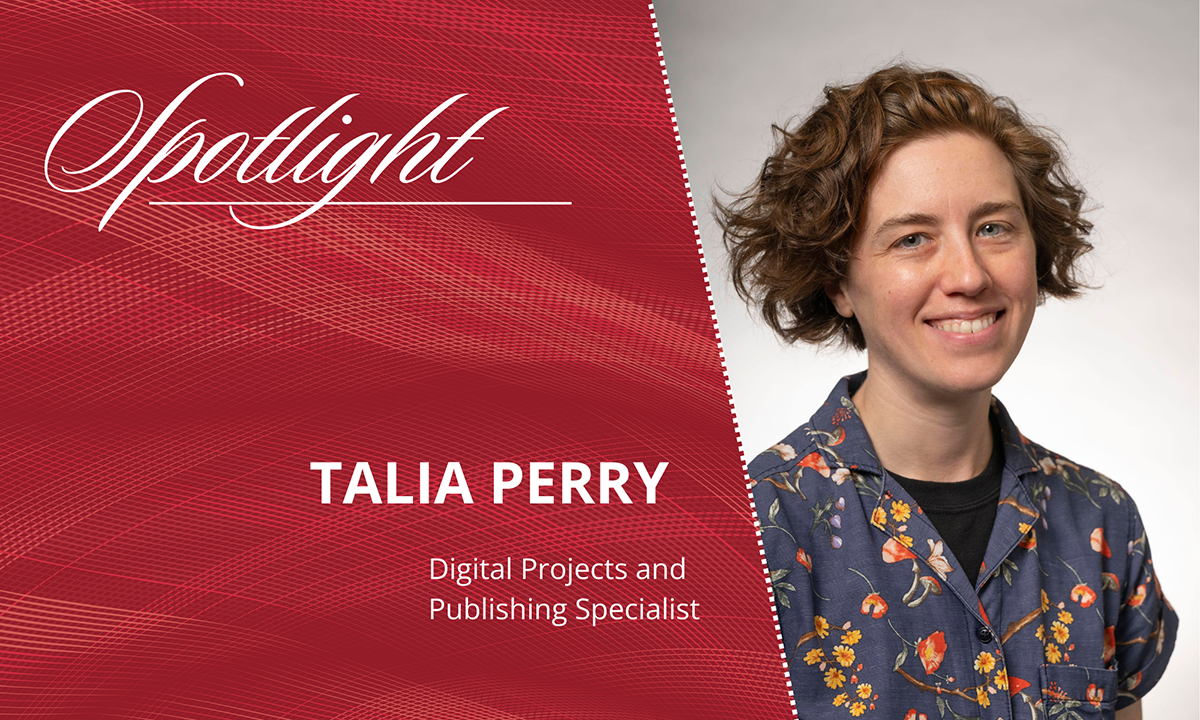
At the University Libraries, faculty and staff bring diverse backgrounds and interests to their roles, elevating the Libraries’ culture of interdisciplinary collaboration and lifelong learning and curiosity. We asked Digital Projects and Publishing Specialist Talia Perry a few questions about her work, to find out more about the inspiration behind her contributions to the campus community.
Q: In your own words, what is a quick overview of your role at the Libraries?
A: My title is “Digital Projects and Publishing Specialist,” which sounds both highly specific but also exceedingly vague! I manage the Library Publishing Service, where we act as the publisher for a collection of open access journals. With the centralization of publishing activities that took place over the summer, I’ve also started working closely with the CMU Press team to produce digital outputs for books and book-like objects. Most of my time is spent coordinating and supporting various digital projects that the University Libraries hosts, maintains, and/or creates. I also hold workshops for those who might not need our publishing services, but are still interested in learning more about academic publishing, digital humanities, open access, etc.
Q: Talk a little about the work you’re most passionate about. Why have you chosen to pursue this work within a library setting?
A: Just a few weeks ago, we held the first CMU Forum for Student Publishing here at Hunt Library, which I hope is the start of offering more support for student publications. I won’t repeat myself too much, since the Libraries already did a great write-up of the event and partner exhibit here. One of the later questions of this interview positions the Libraries as “neutral” space, the college that sits between the other colleges and facilitates connections across; in answer to your question “why here?,” these journals, zines, blogs, anthologies, etc. come from all corners of campus, and don’t have many other opportunities to interact directly with one another. As the home of the University Archives, it’s apt and kind of poetic that the past, present, and future of campus publishing can all share the same physical space.
Q: Share an experience or skillset that people might not expect a librarian/library worker to have. How is it a game changer for the work you do at CMU?
A: Most people who don’t already know me would probably not expect someone in my role to be an architect (that is, the kind who designs buildings). I practiced architecture for several years before I began experimenting with digital design and online exhibitions, which is the short version of the story of how I ended up doing what I do now. But still today, my approaches to project management, to visual communication, to creative problem-solving (troubleshooting by any other name!) are all inherently grounded in architectural thinking and the methodologies of practice I’ve brought with me.
Q: The Libraries serves as a neutral convening space to bring different areas of campus together. How do you value collaboration in your work? Can you give us an example of a recent collaboration that has helped a project reach new heights?
A: While I don’t want to downplay the importance of collaboration with colleagues within the Libraries, which has resulted in endless workshops, events, programs, etc., my role necessarily also interfaces with faculty, staff, and students across campus every day. Each project that I work on — a scientific journal, a book about architectural history, a bespoke digital humanities tool — involves a necessarily interdisciplinary team of faculty and staff, which means I get to learn something (often a lot of somethings) new, a definite job perk! I think bringing together diverse experiences and expertise always results in a more exciting final product, and tends to consider a wider audience, but in the case of most of the things I get to work on, the final digital project wouldn’t even be possible without extensive collaboration.
Q: What’s something in the Libraries that speaks to you personally? This can be a book, something in the Archives or Special Collections, a space in one of the buildings — anything you want to highlight!
A: So many amazing things at the Libraries to choose from! I realize that this sort of goes against my role being firmly situated in the digital world, but I really relish the physical and material space of the library (all our libraries), and watching them change over time. I tend to gravitate towards local collections, including objects directly tied to the CMU community. For the Forum a few weeks ago, the Archives pulled many fantastic examples of historical student publications from their shelves; some writing was poignant, some scathing, some hilarious, some unwittingly prognostic. Perhaps these voices “speak” more audibly to someone embedded in the present of that past.
